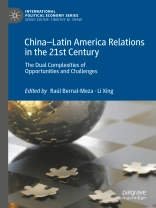This book conceptualizes the economic relations between China and Latin America in different national cases from the perspectives of international political economy–based structuralism theory, the core-periphery model and the world system theory. It contributes to the interpretation of the consequences of the interaction between China’s successful modernization and Latin America’s failed development model.
विषयसूची
1. Introduction: Understanding China-Latin America Relations as Part of the Transition of the World Order.- 2. Advancing Autonomy? Chinese Influence on Regional Governance in Latin America.- 3. One Step Closer: The Politics and the Economics of China’s Strategy in Brazil and the Case of the Electric Power Sector.- 4. Cooperative Relations with China in Brazil’s International Politics: Scope and Interests of the Global Strategic Partnership.- 5. A Goat’s Cycle: The Relations between Argentina and the People’s Republic of China during the Kirchner and Macri Administrations (2003-18).- 6. China–Venezuela Relations in a Context of Change.- 7. Chile and China, 2000-2016: the Humming Bird and the Panda.- 8. China and Argentina, Paraguay and Uruguay: Similarities and Differences.- 9. Revisiting Chinese and Latin American Economic Development: an Unintended Consequence of Different Industrialization Strategies.- 10. Conclusion: China and Latin America in Global Political economy – the Development of a New Core-periphery Axis.
लेखक के बारे में
Raúl Bernal-Meza is Professor at the National University of Central Buenos Aires, Argentina, and the Arturo Prat University, Chile. Raul is a specialist in international relations in Latin America.
Li Xing is Professor and Director of the Research Centre on Development and International Relations, Department of Politics and Society, Aalborg University, Denmark. His research areas are international relations, international political economy, emerging powers and world order.












